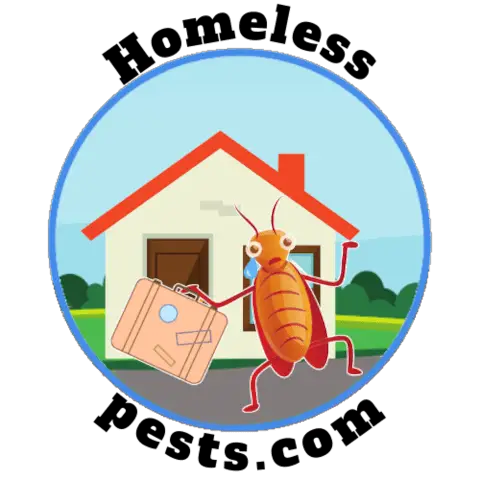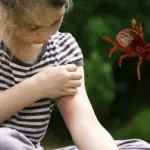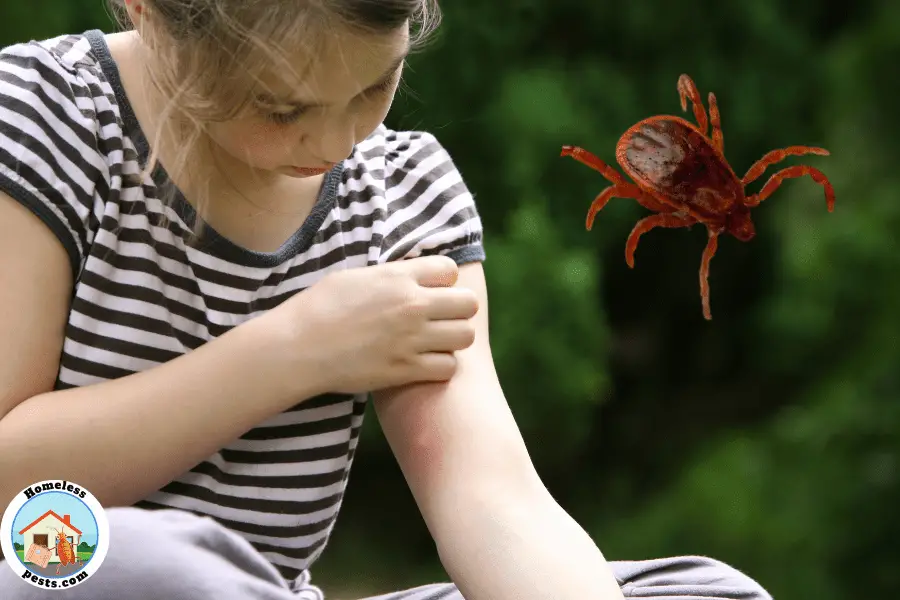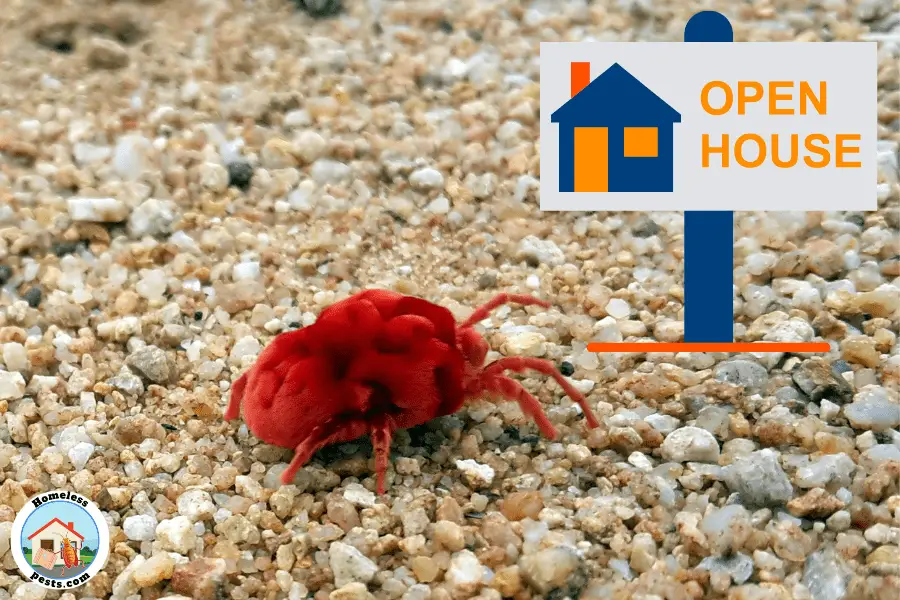As a pet owner, I know how difficult it is to prevent your pets from going outdoors. Let’s face it, our furry friends are just playful in nature. At times though, this can be worrying because our pets can be exposed to many dangers; one of these being an infestation by parasites known as chiggers.
Chiggers are tiny parasitic mite larvae that feast on a host during spring and summer. They can target humans and pets and their bites present as small grouped red lumps. Chigger bites can be incredibly itchy and unpleasant for the targeted host.
I have carried out extensive research on chiggers, which I have successfully used for my own dog to protect her from chiggers. This article will provide you with information to help you with identifying the symptoms of a chigger bite as well as treatment and prevention.
Symptoms of chigger bites on your pets

Just as with human chigger bites, your pet is going to be most at risk when outdoors, either when playing in the yard or on a long walk in the park. Chiggers enjoy a certain type of habitat, so if you have a very bushy yard or enjoy hiking through forested areas, that’s prime chigger territory.
In fact, chiggers are quite difficult to spot on a pet’s fur. They really are difficult to see with the naked eye, so first-time pet owners normally notice the symptoms of a chigger bite first.
Some of the symptoms that should tell you that your pet is suffering from chigger infestation include:
- Loss of hair.
- Broken skin from consistent scratching.
- Red raised bumps.
- Rashes, especially on the parts that have come into contact with the ground.
- Erythema – red patches on the skin.
- Orange crusting on the skin.
Once you notice these symptoms on your pets, it’s best to take them to the local vet just to get some soothing ointment for the bites. Chigger bites are painful but rarely fatal and don’t have the same level of danger as tick bites.
If you think you’ve been bitten by a chigger yourself, then feel free to read my full article on how to identify a chigger bite.
Pet prevention methods against chiggers

As a pet owner, it is only natural for you to wonder, “How do I protect my pet from chigger infestation? There are several natural and chemical methods that you can apply to prevent your pets from chigger infestation.
Natural methods of preventing chigger bites:
Create an anti-chigger landscape
Another natural method to protect your pet and prevent it from chigger infestation is clearing long thick moist vegetation in and around your home yard. Chiggers survive in large thick bushes or grasses, and clearing out such bushes will eliminate their habitat, keeping your pet safe from their attacks.
Not only will a more minimalist approach to your backyard reduce the risk of a local chigger population, but it will also save you the time of garden maintenance.
For more information about how to keep chiggers out of your yard, please read my full article.
Keep pets indoors
One of the most natural methods to protect your pets from chigger infestation is keeping them indoors. Preventing your pets from engaging in outside activities will keep them chigger, and other pests, free.
As natural and as safe as this method sounds, it is quite unfair and boring for your pet to keep from stepping outside to explore and have fun. Remember, chiggers like tall grass, and warm weather. If you can walk your dog on the sidewalk, it’s going to be fine but if your cat is allowed out into the yard, it might encounter chiggers.
Wash and groom your pet
Chiggers are fairly slow-moving creatures, so if you absolutely have to let your pet outdoors, giving them a wash is vital. You can literally brush or rinse off any pesky chiggers if you act quickly enough.
I normally take my pooch for a long walk in the hills around my house on Saturdays. She makes the most of it, running around in the grass and playing in the creeks. The minute we get home, she goes straight into the bath (something Mia forgets every week!). While she is still damp, I also give her a good going over with a grooming brush – this really reduces the fur she sheds too.
Since I started doing this, it has really reduced the instances of chigger bites as well as the presence of ticks and other pests.
Using chemicals to prevent chiggers
If the natural prevention methods I’ve spoken about in this and other of my articles don’t work, you may feel the need to use pesticides.
Before using any chemical method to eliminate chiggers and any other parasite you feel poses a threat to your pet, it is advised that you make sure that they are really safe for your pet.
It’s usually easy to tell straight from the label, but if you are in any doubt then I’d recommend you call a professional pest control company instead. Connect with a local exterminator by clicking here.
Spraying pesticides
Treat your yard by spraying chemical pesticides in every part of the yard at least once a month. The pesticide will keep the chiggers away from your yard, making it safe for your pets to roam free outdoors.
Using pest repellent
Apply pest repellent chemicals to your pets. The repellents will keep the pests away, especially those meant for chiggers. Ensure that the repellent you use is harmless to your pet, and if you feel that you are unsure about the repellent, you should check in with a veterinarian.
Chigger Active Seasons
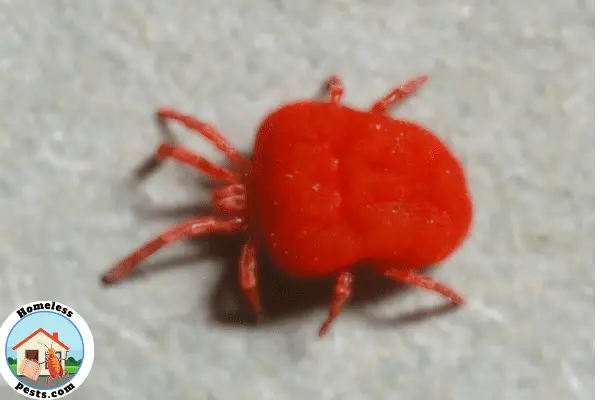
As a pet owner, preparation is key so knowing when chigger season is coming round is important.
Chiggers are mostly active in favorable temperatures and can hardly survive in the cold. Therefore, in the winter, chiggers are inactive but become active from late spring through to early fall. In the USA, the chiggers are more active in areas where temperatures favor their survival, but you can actually find them all over the country. For a detailed look at chigger hotspots in the USA, please refer to my full article.
All pets, either young or old, are at the risk of chigger bites, so it is advised that you protect pets of all ages with the methods mentioned above.
Best chigger prevention products for dogs
The itchiness that comes after infestation by chiggers on dogs can be very uncomfortable. In extreme cases, your vet will probably prescribe prednisone to ease your pet’s itchiness
Some of the treatments and preventive products that are most effective are those that contain acaricides. This not only kills pests such as chiggers, ticks, and other mites on the skin it can also help repel these pests.
Seresto

Shop on Amazon.com
PetArmor

Shop on Amazon.com
Frontline

Shop on Amazon.com
Best chigger prevention products for cats
The effects of chiggers on cats are no different from dogs. Chiggers cause irritable itchiness to cats as well. You can prevent this from happening by applying pest repellent to your cat.
Some of the products that you may use on your cats for treatment and prevention purposes include:
Seresto

Shop on Amazon.com
PetArmor

Shop on Amazon.com
Frontline

Shop on Amazon.com
Can You Get The Chiggers Transmitted To You By Your Pets?
Unlike other pests such as fleas or lice, chiggers don’t usually move from host to host. They are normally encountered in their preferred habitat and then latch onto a host. They can feed for several days before dropping off and entering their next life cycle stage. After this point, chiggers become predatory and no longer need a host.
However, if you and your pet were relaxing or playing in the same chigger-infested area, it’s just as likely that you are bitten as they are. So if you are also experiencing some itchy bites, this is much more likely how you got bitten.
Natural Technique To Get Rid Of Chiggers On Your Dog At Home
If you happen to notice that your dog has been around an area with chiggers or notice a chigger on your pet (great eyesight!), then you can use this technique to get rid of the chiggers.
A soothing bath
One of the tried and tested ways to soothe chigger bites is to bathe your pet in warm water containing Epsom salts, oatmeal, and green tea. This is also great for us humans.
Fill up the bathtub or suitable container, and then add about one to two cups each of Epsom salts, oatmeal, and green tea leaves. If you can get your pet to soak for up to 15 minutes it will really help.
However, if you can’t get them to physically stay in the bath, then you can apply a wet cloth directly to their bite. Doing this for a few hours, replacing the cloth every so often, will have a similar result.

So, why not stock your medicine cabinet with some Epsom salts for this summer? You can even get it delivered to your door by buying it on Amazon.com today.
This technique will surely help your dog and ease the itchy feeling.
What Does A Chigger Bite Look Like On Dogs?
It is not easy to identify whether chiggers have bitten your dog. If your dog happens to be scratching a lot, one way you can tell that the itchiness is from a chigger bite is that chigger bites are evident by small red bumps that appear in clusters compared to other pests bites.
For more information, read my full article on chigger bites.
Can Dogs Bring The Chiggers Into Your Home?
When your dog has been exposed to chiggers, it is likely to bring the chiggers into your home, and the only way to prevent that is by applying a pesticide that fights chiggers on your dog before allowing it to step out.
However, as I’ve mentioned before, when a chigger latches onto a host and eats its fill it will then become quite harmless. There is little danger of a chigger biting another host and they aren’t known for spreading diseases. Apart from the vulgarity of having these little pests in your home, they really won’t cause any additional suffering.
